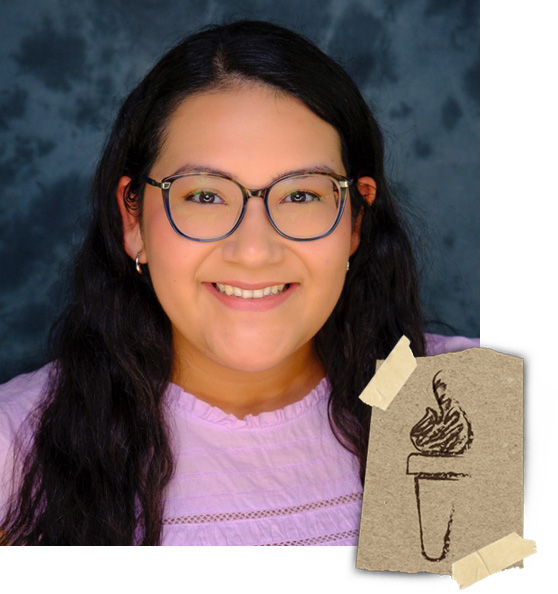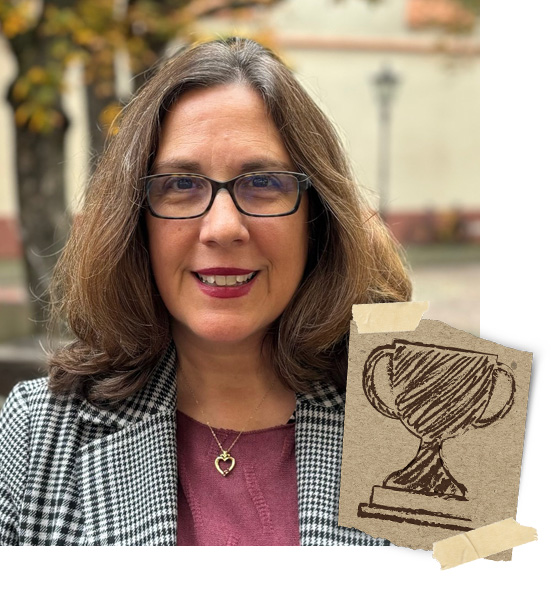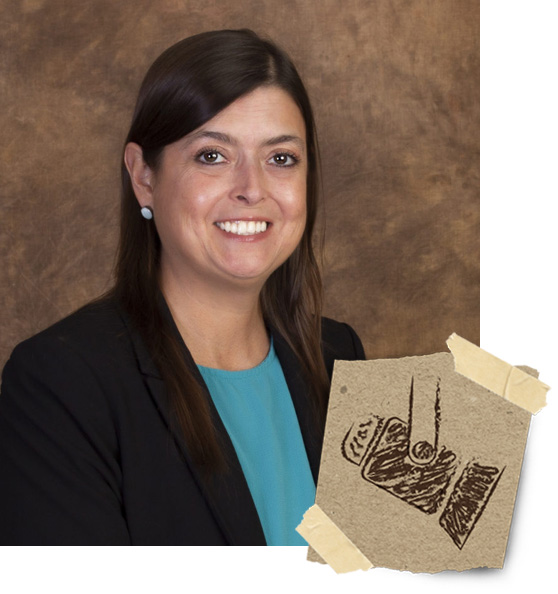Access Torch: Jessica Saucedo
November 11, 2024 - Emily Jodway
 Jessica Saucedo, an ecological/community psychology graduate student in the MSU Department of Psychology, is our Access Torch for the month of November. During November, we celebrate Native American Heritage Month and the numerous contributions Native American and Indigenous peoples have brought to our society and culture. Saucedo is passionate about the well-being and development of preschool-age Indigenous children, and applies Indigenous, community-engaged and strengths-based approaches to discover new ways to improve early childhood development and connect children and their families to their culture.
Jessica Saucedo, an ecological/community psychology graduate student in the MSU Department of Psychology, is our Access Torch for the month of November. During November, we celebrate Native American Heritage Month and the numerous contributions Native American and Indigenous peoples have brought to our society and culture. Saucedo is passionate about the well-being and development of preschool-age Indigenous children, and applies Indigenous, community-engaged and strengths-based approaches to discover new ways to improve early childhood development and connect children and their families to their culture.
Saucedo hails from Southern California and earned her undergraduate degree in psychology from Cal Poly Pomona. Since youth, she has held an interest in her own as well as the collective Indigenous community’s relationship with the environment and culture. Her father is of Yaqui descent, and her mother Cora, two Mexican Indigenous tribes, but growing up, her family rarely talked about that area of their history, which further led Saucedo to want to understand her roots and culture and help others stay connected to their own cultures.
“That’s what led me to want to study at Michigan State,” she explained. “I wanted to learn more about myself and my family, community psychology and how it impacts large groups of people, and MSU had established the first community psychology program in the nation.”
Saucedo arrived on campus and was connected with Jessica Barnes-Najor, whom she credits as one of her greatest mentors at Michigan State and the person who first sparked her interest in early childhood education. Barnes-Najor is the Director for Community Partnerships in the Office for Public Engagement and Scholarship, and a developmental psychologist whose work greatly involves community-engaged research. She is also connected to the Tribal Early Childhood Research Center and Wiba Anung, a research collaboration with Inter-Tribal Council of Michigan. Saucedo joined Wiba Anung and has taken her research in a similar direction.
“There’s not as much research around preschool age children, even though the three to five-year age is when kids really start watching other people and following what they do,” she said. “In Wiba Anung, we focus on how cultural and language experiences support the well-being and development of preschoolers. Our goal is to really show evidence that culture and language can support childhood and lifespan development.”
For various reasons, these children may have lost or become distanced from their Native cultures and languages connections, and Saucedo and Wiba Anung partner with Tribal Head Start centers and home visitation programs to create curriculum that centers around Anishinaabe culture. The lessons follow the 13 moons of the Anishinaabe calendar. Anishinaabe refers to the collective group of Indigenous peoples from the Great Lakes region.
“There are 13 sheets that we’ve created for the Michigan Tribal Home Visiting programs, one focused on each moon,” Saucedo said. “Lately, we’ve been working around food, healthy movement, foraging, growing … there’s so much intertwined in the [cultural] relationship with food and traditional food practices.”
The group of researchers worked with mothers, Elders, and food sovereignty activists to learn more about what food means to them, both in individual wellbeing and community health. They created a PhotoVoice project which combined art, pictures, and traditional recipes with explanations from the interviewees themselves on how it relates to their culture. With this, they also added lessons on culturally grounded healthy eating to a curriculum book known as Gikinawaabi in Tribal Home Visiting programs in Michigan. Tribal Head Start director Ann Cameron took note- “So now the team has been working to create lesson guides for teachers to implement the same kind of concepts, but within the classroom rather than at home,” Saucedo explained.
Saucedo stresses the importance of this work being done collaboratively, both within the community and alongside students and faculty at Michigan State. She credits her research partner Beedoskah Stonefish, a master’s student in Epidemiology at MSU, for her help in the creation of the Tribal Home Visiting programs. The positive angle to this community-centered work as well as the relationships she has formed have been two of Saucedo’s favorite parts about her experience.
“The heart of this work is the relationships established with people with so much wisdom and knowledge, who have so much to share,” she said. “I view myself as a liaison translating that knowledge for different age groups. I also really like that everything we do is strengths-based. We highlight not the deficits, but what communities have already been doing for so long to survive and thrive.”
Another project Saucedo recently contributed to was a display at the MSU Museum as part of an exhibition titled ‘Food Fight!,” which centers around the social, environmental, political and economic relationships humans have with food. They worked with a native artist, Eva Oldman, to translate their work to a visual medium.
“I think it was a great way to spread the word and to see MSU supporting our team and our work,” she said.
Each year during Native American Heritage Month, Saucedo likes to pause and reflect on who she is and her chosen path in life, as well as the lives of her ancestors. It gives her renewed passion for her research and the relationships she has formed both in and outside of MSU. She also loves that it brings to the forefront the past and present accomplishments of Indigenous peoples.
“I think this time of year really helps me sit down and reflect and think about who I am and what I’m doing for the future, how I am going to help future generations continue this positive work,” she said. “I’m so glad I can be a part of sharing the constant narrative that Native people are still here. It’s a good reminder that Native and Indigenous people aren’t something of the past. We are present, we are here, and this is just the beginning.”
Honorees’ views are their own and do not necessarily reflect those of the College of Social Science.
Read more:

Access Champion
Faculty/Staff
Dr. Mindy Morgan
Our Access Champion, Dr. Mindy Morgan, is an Associate Professor of Anthropology and an affiliated faculty member of the American Indian Studies Program. Her research explores how Native communities perceive the relationship between Indigenous languages and English, and the use of language and literacy as cultural and historical tools within these communities.

Access Spotlight
Alumni
Dr. Kehli Henry
Dr. Kehli Henry is our November Access Spotlight and an alum of Michigan State University’s Department of Anthropology. She is currently a Research Associate at STEM Ed PaCER Program, a collaboration between MSU, the Center for Native Peoples and the Environment at the State University of New York, and the Sustainable Development Institute at the College of Menominee Nation.

Access Matters
We strive to cultivate an inclusive and welcoming college environment that celebrates a diversity of people, ideas, and perspectives.

